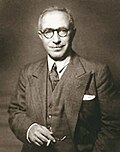Results
While all sources agree that the Wafd achieved a majority, there are disagreements on the figures. Nohen et al and Dolf Sternberger et al puts the numbers as 225 Wafd, 28 Saadist, 26 Liberal Constitutionalist, 6 Nationalists, 1 Democratic Socialist and 33 independents, though the latter notes that a different source disagrees on one seat, 226 Wafd and 32 independents. [3] P. J. Vatikiotis give the totals as 288 to the Wafd out of 327 seats, polling at barely 40 per cent of the votes, as well as 38 independents, with 2.8 million total votes cast out of 4.1 million voters.
 |
|---|
| Party | Votes | % | Seats |
|---|
| Wafd Party | 1,357,206 | 54.56 | 226 |
| Saadist Institutional Party | 406,693 | 16.35 | 28 |
| Liberal Constitutional Party | 292,444 | 11.76 | 27 |
| National Party | 37,512 | 1.51 | 6 |
| Democratic Socialist Party | 16,499 | 0.66 | 1 |
| Wafdist Block | 14,803 | 0.60 | 0 |
| Independents | 362,587 | 14.57 | 31 |
| Total | 2,487,744 | 100.00 | 319 |
|
| Total votes | 2,496,208 | – | |
|---|
| Registered voters/turnout | 4,126,879 | 60.49 | |
|---|
| Source: Khatib |
This page is based on this
Wikipedia article Text is available under the
CC BY-SA 4.0 license; additional terms may apply.
Images, videos and audio are available under their respective licenses.



